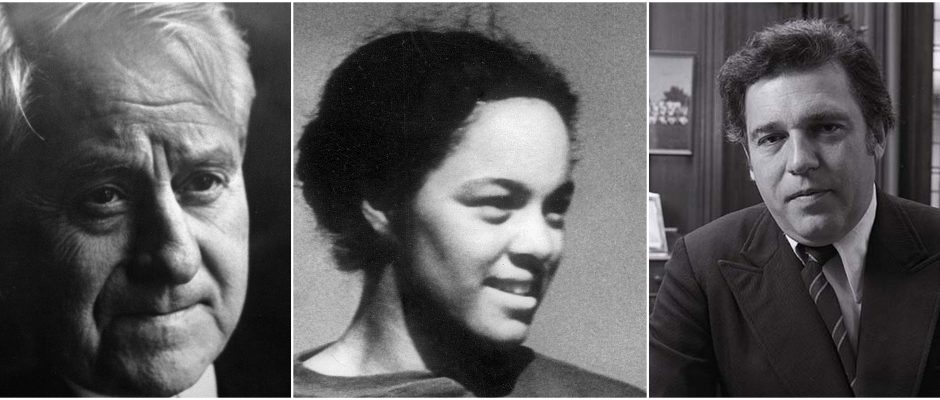Britannia Secondary

(L) Angelo Branca; (C) Barbara Howard; (R) Dave Barrett
Angelo Branca (1903 – 1984)
Angelo Branca was born in a tiny community on Vancouver Island to Italian immigrant parents. In Vancouver, he attended Lord Strathcona Elementary School and Britannia High School. He befriended others like himself, who belonged to ethnic minorities, and was quick to defend them from schoolyard bullies.
In 1926, Branca opened a law practice at Main and Hastings Street. He soon gained a reputation as a brilliant defence lawyer, and a defender of the disadvantaged and downtrodden.
Branca was a gifted athlete. In 1934, he became the Canadian amateur middleweight boxing champion. In 1938, he became a crown prosecutor, the youngest in the province. He prosecuted a number of famous cases, often showing leniency towards the more unfortunate.During World War Two, he came to the aid of Italians who had been interned after being accused of being a threat to Canada’s national security.
In 1963, Angelo was appointed a judge of the Supreme Court of British Columbia. In 1966, he was elevated to the Appeals Court of British Columbia where he served until his retirement in 1978.
Barbara Howard (1920 – 2017)
Excerpts from a story posted on the BC Black History Awareness Society website:
First black woman athlete to represent Canada in an International competition and the first person from a visible minority to be hired as a teacher by the Vancouver School Board.
Born and raised in Vancouver, Barbara grew up in the Grandview neighborhood with her sister and three brothers; she attended Laura Secord Elementary School, and Britannia High School. It was during high school that she demonstrated her remarkable and unprecedented speed; in 1938 was a member of the Canadian Track Team, representing Canada at the British Empire Games in Sydney Australia. In 1959 she graduated from UBC with a B.Ed, degree.
Her teaching career spanned more than 40 years, teaching at Hastings, Henry Hudson, Lord Strathcona and Trafalgar elementary schools.
Awards and Recognition
- In 2010, she received a Remarkable Woman Award from the Vancouver Park Board for “her passionate dedication to inspire others to make a positive difference in their community.”
- In 2012, she was inducted into the BC Sports Hall of Fame.
- In 2013, received the Queen Elizabeth II Diamond Jubilee Medal.
- In 2015 she was named to Canada’s Sports Hall of Fame.
- In September 2018 the City of Vancouver renamed 15 public spaces to commemorate the work of prominent local residents. The Cambie Street Plaza, located south side of the Cambie Street Bridge and north of the east off ramp was renamed the Barbara Howard Plaza.
Barbara Howard tells her own story (quoted from Senior Stories: A Sentimental Journey)
http://seniorsstories.vcn.bc.ca/2014/10/31/sprinter-barbara-howard-east-van-pe-teacher-2/
Dave Barrett (1930 – 2013)
The following information is drawn in part from an article, Dave Barrett: The Man Who Changed a Province, by Tom Hawthorn, published in The Tyee on 2018/02/03.
Dave Barrett was born in Vancouver on October 02, 1930, the youngest of three children. His father Samuel, a twice wounded veteran of World War One, operated a horse-drawn fruit wagon. His mother, Rose, had been born in Tsarist Russia. Both were of Jewish heritage, and both were active in socialist causes.
As a young boy, Barrett delivered the Vancouver Sun and Star Weekly papers and worked in a packing plant. He attended Laura Secord Elementary and Britannia High School. He became active in school theatre where he showed a talent for being in the spotlight. After high school, he attended Seattle University where he earned a degree in Sociology. After returning to Vancouver, he worked with children in foster care young offenders held in Oakalla Prison. Later he studied at St. Louis University in Missouri where he studied for a Masters degree.
Barrett first won election to the British Columbia legislature in the 1960 provincial election, as a candidate for the Co-operative Commonwealth Federation, later called the New Democratic Party. He won re-election in the next four provincial elections.
In the 1972 provincial election, Barrett led the New Democratic Party to victory. During the next three years the Barrett Government passed more than 400 bills. Its accomplishments included reforms to BC’s welfare system, the establishment of the BC Labour Relations Board, the creation of the Insurance Corporation of British Columbia, and the province’s PharmaCare program, and the Agricultural land Reserve. Despite these accomplishments, the Barrett Government was defeated by the Social Credit Party in the 1975 provincial election.
In the 1988 federal election, Barrett was elected Member of Parliament for the riding of Esquimalt. He lost his seat in the 1993 federal election. During 1998 – 2000, he led two inquiries into what was popularly known in British Columbia as the ‘leaky condo crisis’. He retired from public life in 2010.
Posted: August 10, 2020
(Note: the information shown here was gathered via Google searches.)
